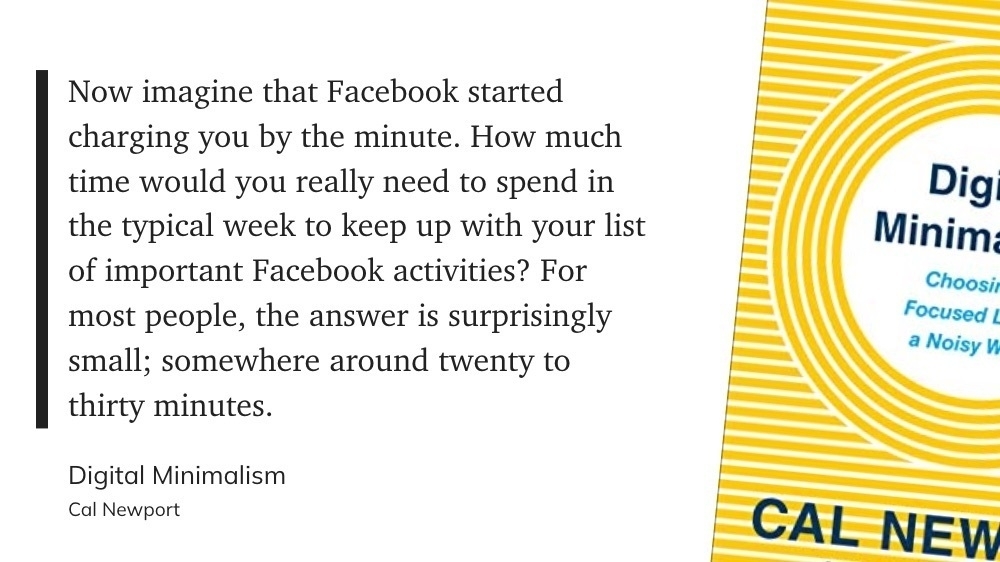Digital Minimalism
- The Economist weekly magazine - This is a very high-quality global-perspective news magazine, though a bit limited in topics of focus. I often read from the app, exporting articles to Pocket that I want to highlight or annotate, so that they enter Readwise, where I keep all my reading notes for review. If I have errands to run before I get through reading, I switch to listening to the articles.
- The Guardian (US edition) weekly news magazine - This is another high quality global-perspective news magazine, and will often hit the important topics that would not have made it to The Economist. I get the actual physical edition of this, only. The puzzles at the back are a nice bonus.
- Anabaptist World - This year, The Mennonite and Mennonite World Review merged to become this news magazine. It’s published triweekly or so (16 issues a year), and covers various USA and global anabaptist news and commentary.
- The Indianapolis Recorder - This is my local news and the best source in Indianapolis. Even though it is labeled with the purpose of continuing to “support and empower African Americans”, it has the broadest and best reporting for all.
- Delayed Gratification - This is a quarterly news magazine that looks back over the quarter. Though I love the idea of this one, and they create a beautiful product, I will probably be dropping it when it is renewal time, as the topics tend to be a bit too pop for my tastes.
- Plough Quarterly - this is another Anabaptist magazine. It is published by the Bruderhof (rather than Mennonites), and has a broader scope & appeal and is not just for Anabaptists. It has both current and historical essays and material.
- New Philosopher - a high-quality magazine, with each issue being like a symposium on a certain philosophical topic or question.
- Offscreen - a physical product for digital people. This magazine brings humanity to technology. (warning: this one does have supporter ads, but they are minimal and minimalist.)
- Ernest - I just started reading this one after learning about it from @adders. It’s a beautiful journal of adventure.
- Wear a mask over mouth and nose. Not ones with valves.
- Wash those hands. With soap. All over.
- Keep six feet away from other folks if you have to be out.
- Limit your time in “shared breathing spaces” (indoors).
- Work from home if you are able.
- Cancel any upcoming travel that involves transit or groups.
- If you have a fever or any possible symptoms, get tested.
- Don’t touch your face, mouth, or ears with unclean hands.
- Make sure your info/documentation is up-to-date on contacts, including the fact that people may not have access to their work phone #s
- Also check that you have contact info for those “jurisdictional” contacts outside your org (e.g. health, emergency services, city, county, state, etc.)
- If you rely on teams that are engaged on a retainer basis to help during crisis, verify whether they still have capacity for you, due to the widespread nature of the event
- As always, review any lessons you are learning along the way, so that you can create action plans to iteratively improve
- Make a plan for how physical assets are leaving (and eventually returning) to your physical locations
- If you’re not already operating on Zero Trust Networking principles, verify that critical systems require additional protection beyond requiring VPN for access (adding multifactor authentication and enhanced monitoring, for example)
- Evaluate your ability to continue to protect the end-user devices that are connecting to your systems: Can you keep them updated? Do you have EDR (endpoint detection and response) capabilities fully deployed? Can you define a “good” device through NAC (network access control) rules and quarantine bad devices until they meet specifications?
- If folks are accessing most of your systems through an online suite (such as O365, Zoho, or GSuite), evaluate those configurations towards security standards and make critical changes
- Work with your monitoring teams (such as NOC and SOC) to re-evaluate your expectations around what are standard behaviors and what activities need to be reviewed and/or escalated
- Avoid hoarding, so that those with great need still have access. This goes both for physical goods but also for consumption of services and manipulation of markets.
- People are losing work and income during this time. Can you reach out to give or receive assistance? Maybe through a an organization you’re part of?
- Are there people in your life that need to hear from you? Or who you need to check in with? Get a call or video chat going.
- As organizations do away with BS, punitive, or unnecessary measures, hold them accountable not to reinstate them.
- For those of you working from home, could you continue to work from home after this is over? For at least a portion of the time?
- Which meetings need to still exist? Which of those still need to be in person?
- If you are going outside more to get out of the house, is this building up your inspiration and capacity for walking, biking, and other people-powered transport? Could this stretch the radius in which you opt to walk or bike instead of getting in a car?
- Are there edifying and/or relaxing places that you’d like to visit, which don’t require a plane trip?
- If you order in, or drive through, can you avoid the plastic utensils and containers? Maybe bring/use your own?
- Are you cooking more at home? Could you keep doing more of that? Are there local farmers you can support?
- Have you had to give up how much meat you consume? Could you keep eating less meat and fewer animal products?
- Take your meds, cook good food, and stay on your plan
- If you work with any kind of therapist(s), see if there are options for continuing that work, maybe through video
- If you feel overwhelmed, call a crisis hotline if you need it (1-800-273-8255) or get help via services like betterhelp or talkspace
- Talk to your loved ones and your communities of support (faith and service organizations, for example)
- Get some exercise at home and take walks in open & natural spaces
- Give yourself grace when you feel down
- Practice gratitude for the things that are going well
- Code Switch: If you don’t know what code switching is, you definitely need to listen to this. If you already do, you will likely enjoy the variety of topics and perspectives and the charming hosts.
- Cyber: covering information security from the perspective you’d expect of Motherboard/Vice
- The Ezra Klein Show: this is my new favorite show, overtaking Farnam Street as the best big ideas podcast, due to having a perspective, better back-and-forth, and deeper-dives
- Freakonomics Radio: granted, some of this is “pop econ”, but it’s entertaining and frequently has good investigative research or covers big ideas.
- From Embers: this is a Canadian anarchist podcast that often covers indigenous rights and our climate catastrophe
- Invisibilia: a charming and perspective-widening show from NPR
- The Knowledge Project: this podcast is interviews with “big thinkers”. The interviews often wander, but there are almost always important takeaways or food for thought.
- Long Now - Conversations at the Interval & Seminars About Long-Term Thinking: the perspective of these podcasts is incredibly important, and the topics are often enlightening. They suffer a bit from being Silicon Valley focused, but are otherwise very good.
- The Peter Attia Drive: deep dives on health, medicine, and longevity.
- Note to Self: a philosophical take on technology trends.
- Radiolab: entertaining, sometimes enlightening, and incredibly well-produced.
- The Rebel Beat: a source for a wide variety of radical political music.
- Rebel Steps: how-tos for people learning about organizing for direct action, solidarity, and mutual aid.
- Risky Business: information security current events coverage, with excellent analysis. Skip the branded interviews
- Scene on Radio: As you add this podcast, make sure you have your app setup to listen to a season in order. Seasons 2 & 3 (“Seeing White” and “Men”, respectively) were excellent, and I’m looking forward to season 4.
- Sleepwalkers: in-depth discussion around the opportunities and risks of artificial intelligence
- Wait Wait…Don’t Tell Me!: a humorous weekly news quiz that you probably already know about.
- How To Be An Antiracist by Ibram X. Kendi: it’s rare for me to give 5 stars to anything, but Kendi did an excellent job sharing complex and important perspectives in an informative and actionable way.
- Digital Minimalism by Cal Newport: Highly recommended book exploring how you can focus your digital time on the things that matter most. Unlike many minimalism-focused works, Newport goes into great detail in what to do with the space & time that you free up. My full review/reference (as well as links to my experiment and a podcast I recorded for Resilient) are found here.
- Educated by Tara Westover: an incredible memoir of someone who grew up in an abusive, anti-intellectual, conspiratorial home environment without any real schooling (home or otherwise) and went on to earn a prestigious PhD.
- How to Change Your Mind by Michael Pollan: an informative book about psychedelics and their applications in medicine.
- Talking to Strangers by Malcolm Gladwell: incredible narratives and insights of how things can go wrong when we talk to strangers, along with some (admittedly light) recommendations on how we can change structures and systems to do better.
- Offscreen edited by Kai Brach: I read issues 17 through 19 of this large print-only magazine in 2019, and often found value in the interviews, perspectives, and recommendations. “Offscreen is an independent print magazine that examines how we shape technology and how technology shapes us. "
- Southern Horrors by Ida B. Wells: this classic and important work is a reminder of how fear, power, and violence were (and still are) wielded to subjugate people.
- The Power of Habit by Charles Duhigg: All about the various factors that affect habit formation and change. You can see my full reference and review here.
- Rework by Jason Fried & David Heinemeier Hansson: the folks at Basecamp continue to bring countercultural guidance on simplicity, focus, agility, and sustainability for operating an organization.
- Start With Why by Simon Sinek: over and over, Sinek reminds us that our why is what people are drawn to, and that the rest is rationalization.
- Ultralearning by Scott H. Young: a collection of tips from Young’s ultralearning experiments and research.
- Technopoly by Neil Postman: a book of criticism that asks more questions than it is prepared to answer, but still an incredibly important work to grapple with. I read this as part of Strangers Book Club, which I highly recommend.
- The Oz Principle by Roger Connors, Tom Smith, and Craig Hickman: this is a book about continually asking the helpful question “What else can we do to rise above our circumstances and get the results we want?”
- Food Rules by Michael Pollan: short summaries of Pollan’s research on eating, including many tips on how not just what to eat.
- Open Borders: the Science and Ethics of Immigration by Bryan Caplan and Zach Weinersmith: a collaboration presenting the case for open immigration. Unfortunately heavy on the economic benefits and light on the ethical rationale, but still a useful work to bring exposure to this important topic.
- Ten Arguments for Deleting Your Social Media Accounts Right Now by Jaron Lanier: this is a good companion to Digital Minimalism, detailing some of the reasons that most social media is manipulative and unhealthy for people and our digital ecosystem.
- Ancient Civilizations of North America by Edwin Barnhart: an excellent background on the history of North America before modern colonists.
- Heretic! by Matthew J. DiStefano: the title refers to judgments aimed DiStefano, due to theological interpretations rooted in love & justice instead of fear & hate.
- Faith Unraveled by Rachel Held Evans: originally called Growing Up in Monkey Town, this memoir shares Evans’s tale of reclaiming her faith back from a fear & judgment paradigm.
- The Tipping Point by Malcolm Gladwell: stories about how ideas and behaviors gain traction.
- The Third Chimpanzee by Jared Diamond: a look at how humans are and aren’t different from the “other chimpanzees”.
- The Alcohol Experiment by Annie Grace: an informative, judgment-free journey with solid grounding in psychology and behavioral science.
- The World in 2020 by the Economist: this is Economist’s yearly comments and predictions for the coming year.
- The Pioneers by David McCullough: this book by the acclaimed historian covers those who colonized the Ohio Valley.
- Individuals have habits, organizations have routines
- Keystone habits are great for building other habits and producing momentum through repeated small wins
- Keeping a food journal, making your bed, and working out are all habits which have many seemingly-unrelated positive impacts on your life
- “Willpower” is stronger when people feel agency or impact
- Try altering variables like a scientist, in order to see which reward you were actually seeking, and which you might like
- Jot down the things that come to mind with each test; this helps with awareness and attention
- Use 15 minute waits/alerts to help with elimination and analysis
- When I see cue i will do routine in order to get reward
- This is your implementation intention and should be explicitly stated
📚 Four Thousand Weeks: it’s as good as they say.
Nothing original, but a great collection of wisdom distilled from various traditions (faith, agile/lean, strategy, psychology, etc.).
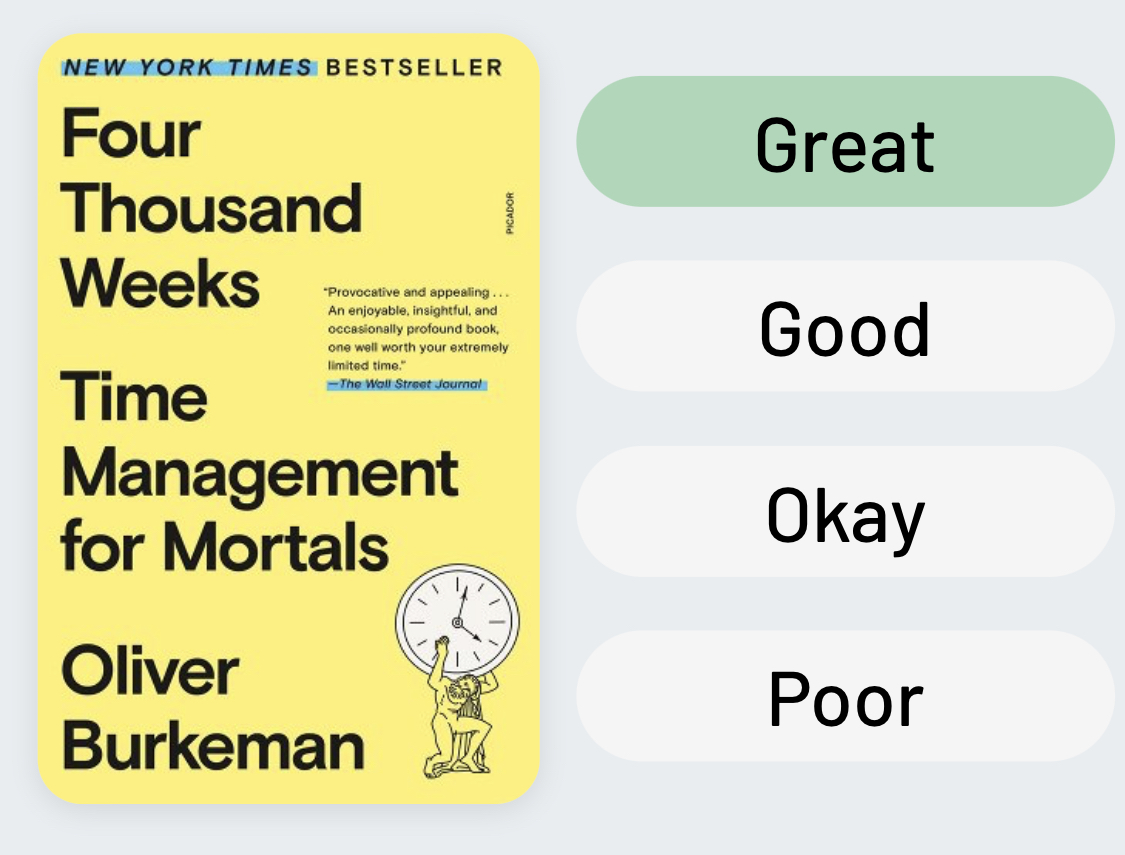
Cheri's tips for a better relationship with the Internet:
1. I abstain from ad-supported and/or algorithmically manipulated social media.
2. I avoid websites with an endless scroll. Aka “doomscrolling.”
3. The only notifications I allow on my phone are calendar appointments.
4. I use privacy-respecting hardware and software, when they exist. When they don’t, I make do with the next best thing. (I’m looking at you, Apple!)
5. I minimize opinion-checking. That is, I form my own conclusions rather than caring what “the internet thinks” about a topic.
6. I don’t frequent places where assholes thrive.
I like this approach to tracking lists and will try it.
Probably works best paired with clarity on your values & priorities, and time-blocking to focus on your priorities.
H/T @jmaxb
2020: News & Magazines Review
To view other 2020 review posts, visit thee main post here.
Newspapers and News Magazines
I tend to prefer “slow news”, focusing on quality over quantity & speed. Most “breaking news” (or even daily news) I don’t need to hear about, and the net effect of rapid-fire news is to introduce more interruptions and unnecessary stress into our lives. I also try to mix both broad (global) perspectives and local reporting.
I reserve most news reading for Saturday mornings, where I usually peruse the following sources, reading just the articles that are relevant to me or challenging to my perspective:
Other Magazines
On the “not news” front, I enjoy a few other magazines. All of these are no (or almost no) advertising. This is important to me, as ad-free means the subscription price represents the truer cost of the writing, doesn’t prejudice the editorial stance of the magazine, and helps free the writing to do much more than “get a reaction”.
Doing this examen helped me to cull a handful of magazines that I’ve not been reading much.
In the next post (here), I will cover Feeds (RSS, etc.) and Newsletters that I subscribe to.
What are you reading? Anything you recommend?
Have you ever created a structured or restricted adult “learning plan” outside of academia?
One example would be picking one topic (or a specific short list thereof) and objective(s), then restrict your reading (books, blogs, news, etc.) to those objectives for a specific period?
📚 The Time-Block Plannner by Cal Newport ⭐️⭐️⭐️
Newport’s method is not new, but the planner summarizes it well and provides a good structure for executing it.
The physical product is less fit for purpose (page size, binding, paper), so practicing here and moving elsewhere.
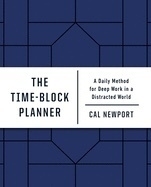
(previously, text-only version of NPR)
We need more non-hyper news options like these.
iOS 14 widgets:
Have you found any (e.g. app suggestions) that are recommending usage patterns that your aren’t even aware you had? I have.
How might you process this information?
In Indianapolis, people are receiving old-but-reprinted anti-Catholic conspiracy-theory books in the mail.
I’m sure the timing is not an accident. Disinformation has become so much more powerful than information.
I still have a ways to go, but did some good work on my Resilient booklist this morning.
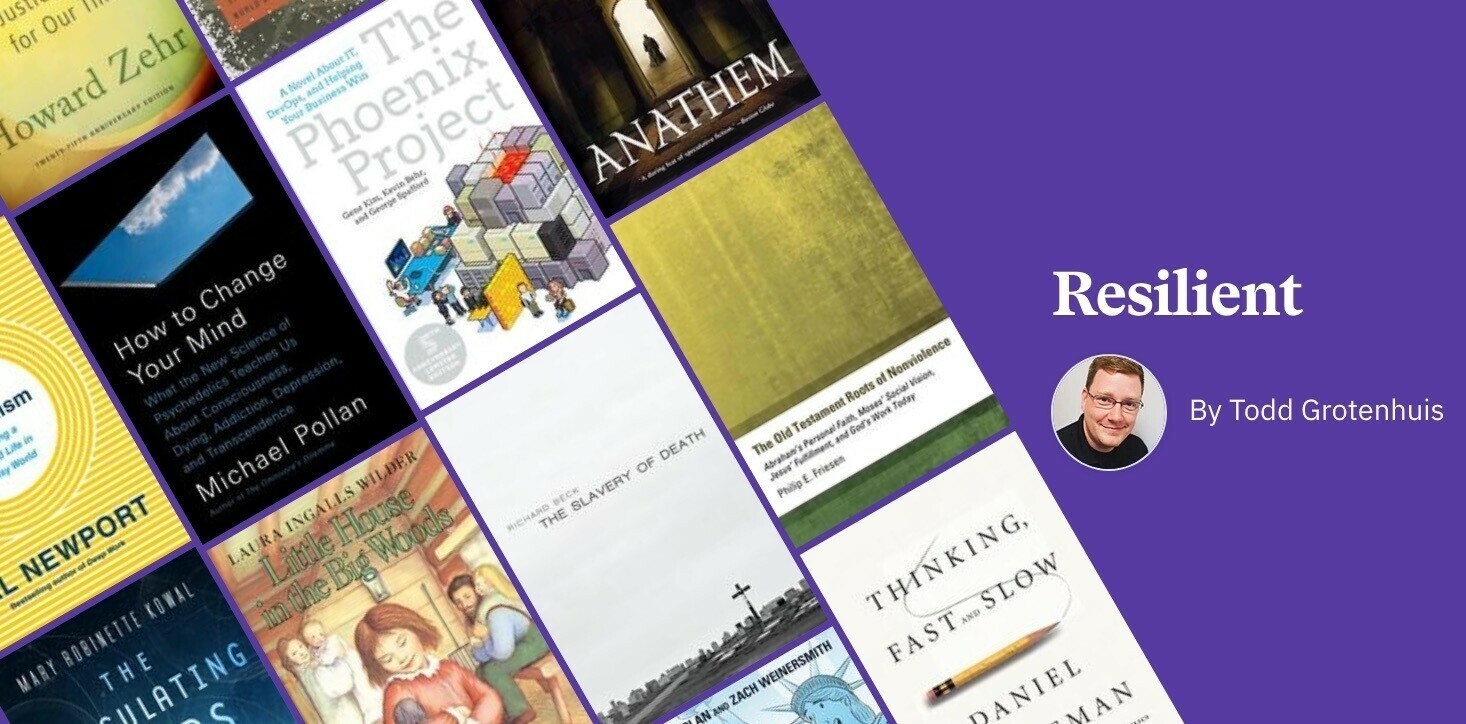
Coping with Covid
This is not another form letter from a company assuring you that we are taking care of things. Instead, this is a Resilient message, looking at the intersections of COVID-19 and the topics we usually explore here: security, society, sustainability, and self.
But before we get to that, let’s have the obligatory and important reminder. As readers of Resilient, you likely don’t need any reminders, but repeatedly getting the word out still helps to flatten the curve and helps ensure that we have enough healthcare resources available to people who need them.
Thank you for helping to slow the spread of the virus, and for helping to get more people through this safely.
Don’t panic! Prepare and persevere.
Security
Business Continuity Plans (BCP) are getting stress-tested. Why? The first reason is that in some businesses or non-business organizations, operations are either having to halt, scale way down, or even scale way up. The second is that some organizations are moving to a great amount of work from home.
Here are a few tips if you have any responsibility for BCP activities:
Here are a few tips if you have any responsibilty supporting increased Remote Work:
Society
The safety measures we are taking will put extra strain on some segments of our society. Here are a few thoughts as we work through these times:
If you’re a praying person, consider the following prayer. Even if you’re not, you may find the items to be good contemplative ideas to spur action and support:
May we who are merely inconvenienced
Remember those whose lives are at stake.
May we who have no risk factors
Remember those most vulnerable.
May we who have the luxury of working from home
Remember those who must choose between preserving their health or making their rent.
May we who have the flexibility to care for our children when their schools close
Remember those who have no options.
May we who have to cancel our trips
Remember those that have no safe place to go.
May we who are losing our margin money in the tumult of the economic market
Remember those who have no margin at all.
May we who settle in for a quarantine at home
Remember those who have no home.
As fear grips our country,
let us choose love.
During this time when we cannot physically wrap our arms around each other,
Let us yet find ways to be the loving embrace of God to our neighbors.
Amen.
From Prayer for a Pandemic.
Sustainability
As we reduce our commuting, travel, and trips around town, we have an opportunity to evaluate our behaviors, and see what habits might stick. This has the potential to reduce petroleum-based travel and move us towards renewables-based vehicles/transportation, better food-production ecosystems, and people-centered cities.
Here are some questions to ponder:
Self
If you’re following the safety tips in the introduction, you are already doing an important part to help slow the spread and ensure that people will have access to medical care. The tips and questions in the security, society, and sustainability sections are not intended to cause panic, but rather present food for thought that could help make things better now and in the future.
Through the period of uncertainty, it’s important to continue to take care of yourself. Again, some thoughts:
I hope you found this helpful.
Is there anything obvious we missed? Do you have any tips to share? Add a comment or send a note.
Originally posted at: Resilient.
Thinking about the confluence of quarantine, Lent, spring break, climate change, & other events.
What have you been learning and evaluating about your rhythms, habits, priorities, & schedule? Are you finding things that weren’t necessary, aligned with your values, etc.?
What’s been harder? What’s been easier? What’s important to you?
I started Cal Newport’s 📚 Deep Work and it has me pondering something.
As expected (since I really enjoyed Digital Minimalism), though I have just started, I am appreciating the book. However, his early focus on productivity is concerning to me. Often, we think of productivity as the One True Measurement (TM) of success, and I’m not sure that’s right.
While effectiveness (towards whatever goal(s) you set) is important, it leaves out factors such as quality, value, repeatability, learning, etc. You could argue that we should build those into the measurements of productivity, but I’d argue we often don’t.
Perhaps my disagreement is due to me being philosophically less of a consequentialist and more of a deontologist or virtue ethicist. In my way of thinking, it’s better to do right with less immediate output than to crank out good output that may be short-sighted.
What about you?
edited to add: Cal addresses this a somewhat when he gets into “busyness” being a (bad) proxy for “productivity”.
Another great decision-making question from James Clear’s newsletter:
“Will this cost me time in the future or save me time in the future?”
What are the tech companies that are doing the most harm? What would be your top 5? Here is Slate’s list.
2019 🎙 Review
When I’m commuting, doing chores, taking a walk, or even playing open-world video games, I often listen to spoken word. Sometimes these are audiobooks, but the rest of the time it’s podcasts.
I recommend Overcast for listening to podcasts, and am a happy subscriber.
This year, I started my own Podcast and Newsletter, Resilient. The frequency is low-volume while I find my bearings. Note: Resilient newsletter posts are free, but you do have to subscribe to get access to the podcasts. This is not expected to be a money-making endeavor for me, but I do want to limit the availability of the voice recordings to those who are truly interested. I charge the lowest price that Substack (my provider) allows and then add a hefty discount on top of that. If you would like a free gift subscription to the podcasts, please message me directly.
While I appreciate the idea of “chatty”, “actual-play”, and “review”-style podcasts, you won’t find those here.
Recommended Podcasts
Further Notes
Last year’s podcast recommendations can be found here. I have re-used some of it as appropriate. You can read about my book recommendations here: non-fiction and fiction.
2019 📚 Review: Nonfiction
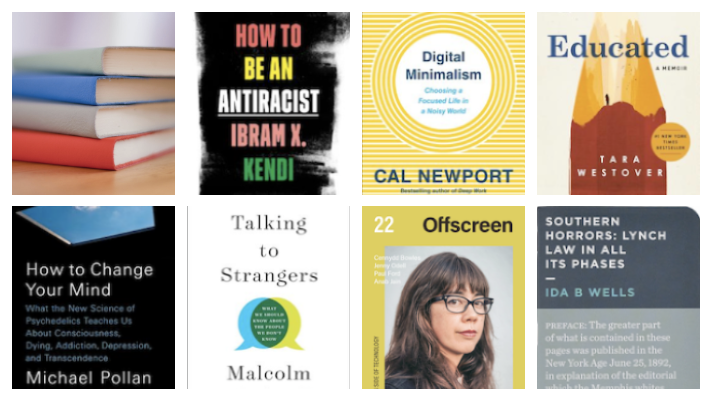
Overview
I set a goal of reading 63 books in 2019, which was a 10% increase over 2019. I met this goal exactly. I have again increased my goal by 10% and plan to read at least 70 books in 2020.
About half of the books I read (31, to be exact) were non-fiction. I seek books that may be “eye-opening”: those that challenge my understanding, worldview, and conceptions. I look for books of criticism, history, philosophy, ethics, theology, psychology, business, economics, and politics.
How I Read
For nonfiction, I get the books multiple ways. If I’m not sure I’ll like it and don’t expect I’ll need to take a lot of notes, I look for the audiobook or summary first in my Scribd subscription and then Libby (to borrow digitally from my local library). If I know I’ll want to reference the book a lot after finishing it, I order a hardback via Indiebound or Alibris. If I expect to learn a lot and/or take lots of highlights and notes, I’ll borrow the ebook via Libby or buy it from an ebook seller.
My book (and article) highlights and notes from all sources go automatically into Readwise.io, where I review 15 highlights each day to aid in retention and reflection. This is one of the ways I start my day, and it’s incredibly valuable.
I rate books between ⭐️ and ⭐️⭐️⭐️⭐️⭐️, with ⭐️⭐️⭐️ being the cutoff for a worthy book. Thus, I will only share about the ⭐️⭐️⭐️ through ⭐️⭐️⭐️⭐️⭐️ books, here.
Recommended Books
⭐️⭐️⭐️⭐️⭐️
⭐️⭐️⭐️⭐️
⭐️⭐️⭐️
Further Notes
For a review of my fiction read in 2019, see here. For 2018 books, see here.
For the Goodreads overview of my reading, see here.
Note: this post has affiliate links. I am linking to things I truly enjoy, and have not been paid or pressured to recommend any of them.
📚 Micro-Review: _The Power of Habit_ by Charles Duhigg
📚 Finished The Power of Habit by Charles Duhigg. ⭐️ ⭐️ ⭐️
This book is mostly useful narratives that introduce the factors that affect habits. It also includes a short “how-to” on changing habits.
Some Insights
How to Change Your Habits
Identify the routine
Figure out what your habit loop is so that you can work to supplant it with another.
Experiment with rewards
Isolate the cue
Each time you experience the feeling, write down answers to the following:
1. Where are you?
2. What time is it?
3. What is your emotional state?
4. Who else is around?
5. What action preceded the urge?
Have a plan
Write it like the following:
Further Reading
Application instructions were very short and only covered in the appendix. For more detailed application notes, read Atomic Habits. I am finishing my read and review of that book, and will link it here when complete.
